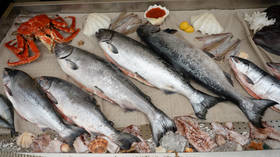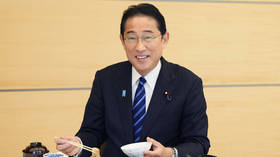Fukushima has not made fish radioactive – Russian data

The fish caught in Russia’s Far Eastern seas since Japan began releasing wastewater from the Fukushima nuclear power plant into the ocean last week show no excessive levels of radiation, Russia’s veterinary and phytosanitary watchdog, Rosselkhoznadzor, has announced.
According to the agency, 443 samples of fish products, including cod, fluke, walleye pollock, halibut, salmon, crab, mussels and canned food, have been studied by its experts.
There were “no positive findings” in the tested products, with the level of radiation in them being within the normal range, Rosselkhoznadzor said. The results “indicate the safety of fish products,” it concluded.
The agency’s laboratory in the Far East monitors fish products on a regular basis, but has stepped up its activities since Tokyo announced plans to dump treated radioactive wastewater from the stricken nuclear plant.
Japan began releasing the liquid into the ocean last week, as part of a plan approved by the UN. The water was used to cool down the nuclear reactors that were damaged during the March 2011 earthquake and tsunami disaster, preventing them from fully melting down.
Despite claims that the liquid is perfectly safe, the move by Tokyo has sparked a backlash from its neighbors China, South Korea, and North Korea. Beijing called it “extremely selfish and irresponsible” and introduced a blanket ban on Japanese seafood products.
In an attempt to alleviate concerns at home and abroad, Japanese Prime Minister Fumio Kishida and three of his cabinet ministers sat down for a meal on Wednesday, sharing sashimi made from fluke, octopus, and sea bass caught off the coast of Fukushima.
Kishida called the meal “very good” and encouraged people to enjoy “safe and delicious” seafood and thus support the Fukushima prefecture.
A similar stunt was repeated by the US ambassador to Japan, Rahm Emanuel, who visited the city of Fukushima on Thursday and had a seafood lunch with its mayor.
Emanuel claimed that “the economic coercion against Japan, the robocalls of harassment and disinformation both here in Japan and around comes right out of China’s playbook.”
He promised Washington would support Tokyo if it fulfilled its promise and filed a complaint to the World Trade Organization (WTO) over Beijing’s seafood ban. The US is going to do so “not just because they [Japan] are an ally, but because there’s legitimacy to the case,” the ambassador said.













